> Steeleye Span > Records > Hark! The Village Wait
Steeleye Span: Hark! The Village Wait
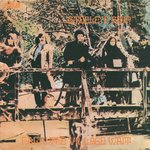 |
Hark! The Village Wait RCA SF 8113 (LP, UK, June 1970) | 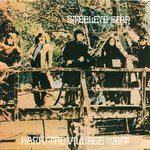 |
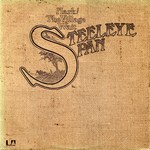 |
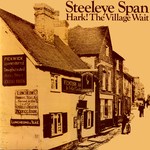 |
Chrysalis / Festival L 36142 (LP, Australia, 1976) |
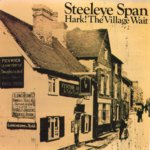 |
|
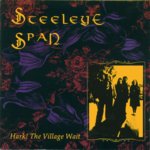 |
Mooncrest CREST(CD) 003 (LP/CD, UK, January 1991) |
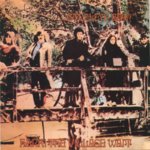 |
|
Engineer: Vic Gamm, Sound Techniques
Note: A ’waits’ is a musician employed by a town to play on ceremonial occasions (historical) and (in plural) persons who welcome in Christmas by playing or singing out of doors at night.
Musicians
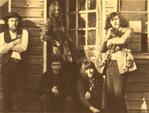 Tim Hart: lead vocals [4],
vocals [1, 11],
electric guitar [2, 4, 7-8],
5-string banjo [3],
electric dulcimer [5-6, 12],
fiddle [10],
harmonium [11];
Tim Hart: lead vocals [4],
vocals [1, 11],
electric guitar [2, 4, 7-8],
5-string banjo [3],
electric dulcimer [5-6, 12],
fiddle [10],
harmonium [11];
Ashley Hutchings: electric bass [2-8, 10-12];
Maddy Prior: lead vocals [2-3, 6-8, 12],
vocals [1, 4-5, 9, 11],
step dancing [6],
5-string banjo [10];
Gay Woods: lead vocals [3, 5, 9-10],
vocals [1, 2, 7-8, 11-12],
autoharp [3],
concertina [5],
bodhrán [6],
step dancing [6];
Terry Woods: vocals [1, 4],
mandola [2-3],
electric guitar [4-5, 7-8, 10, 11],
5-string banjo [4, 12],
concertina [6],
mandolin [6];
Gerry Conway: drums [2-3, 5-8];
Dave Mattacks: drums [4, 10-12]
Tracks
Side 1
- A Calling-On Song (1.13)
- The Blacksmith (Roud 816) (3.41)
- Fisherman’s Wife (3.12)
- The Blackleg Miner (Roud 3193) (2.46)
- The Dark-Eyed Sailor (Roud 265; Laws N35; G/D 5:1037; Henry H232) (5.59)
- Copshawholme Fair (Roud 9139) (2.35)
Side 2
- All Things Are Quite Silent (Roud 2532) (2.38)
- The Hills of Greenmore (Roud 2883) (4.02)
- My Johnny Was a Shoemaker (Roud 1388; G/D 8:1848) (1.11)
- Lowlands of Holland (Roud 484; G/D 6:1116; Henry H180) (6.00)
- Twa Corbies (Roud 5; Child 26) (2.06)
- One Night As I Lay on My Bed (Roud 672) (3.30)
All tracks trad. except
Track 1 Ashley Hutchings;
Track 3 Ewan MacColl
Acknowledgements
[from the LP’s sleeve notes]
We’d like to thank Charles Byrne, John Bailey and Frank Bond for their skill in instrument building; Dave Bland for his time and patience; Andy and Jutta Preece for shelter; Tony Shannon for singing in Toner’s; David and Sally Smyth—is it your hoopy loopy or your loopy hoopy?; Ewan MacColl and Peggy Seeger for fitting us in; Cyril Tawney for having a heart and a pen of gold; Patsy Bird for the flag; John and Pauline Napper for the southern comfort and more; The Mad Sweeney for the tree to perch on; Martin Carthy for our name; Geoff Woods, may you come back to the fold; and Johnny Butler for just about everything else.
Special thanks to Gerry Conway who played drums on tracks two, three, five, six, seven and eight; and to Dave Mattacks who played drums on tracks four, ten, eleven and twelve.
Sleeve Notes
A Calling-On Song
Songs similar to this one are used by the leaders of rapper and long sword dance teams to preface the dancing and to drum up a crowd. The duration of these songs depended on how long it took for a satisfactory audience to assemble. It was customary to introduce each member of the team as the son of a famous person such as Bonaparte, Nelson, Wellington, etc. This, however is our own ‘calling-on’ the tune and the basis for the words coming from the captain’s song of the Earsdon Sword Dance Team.
Hutchings: “It’s a completely contemporary song, but in traditional style, which I wrote especially for the album.”
The Blacksmith
Maddy collected this version from a number of texts in the Folk Song Journals. This Southern English song, like the better known Twanky-Dillo, uses the blacksmith as an epitome of virility with the hammer filling the bill as a phallic symbol. A close variant of this tune is used to the John Bunyan hymn, To Be a Pilgrim.
Fisherman’s Wife
The words by Ewan MacColl, set to a traditional Scots tune, manage effectively to convey the quiet despair of the fisherman’s wife resigned to the frequent absence of her husband with lapsing into self-pity but rather extending an underlying feeling of pride at her lot in life. The song was first heard in the 1959 Radio Ballad Singing the Fishing.
Hutchings: “Although it was written in the 1950s, it is in traditional style and I got it from the tape library which Ewan had in his house.”
The Blackleg Miner
It is strange that a song as powerful and as singable as this should be so rare, yet it has only once been collected, from a man in Bishop Auckland, County Durham, in 1949. Seghill and Seaton Delaval (presumably the Delaval mentioned in the song) are adjacent mining villages about six miles north of Newcastle upon Tyne, but it is difficult to date the song due to the innumerable mining strikes which have occurred. It is, however, interesting as much as it illustrates the violent hatred felt by the ‘union’ men towards the blacklegs.
Hutchings: “This is the most modern traditional song on the album, possibly dating from the early part of the 20th Century, and is sometimes sung by singers from Northumberland. I believe it was suggested by Tim.”
The Dark-Eyed Sailor
A song after the fashion of John Riley commonly found on broadsides. Gay and Terry heard this version from Al O’Donnell, a friend and singer in Dublin. It must be remembered that sea voyages a few centuries ago could take years to complete and it is not surprising that the two lovers should each take one half of a ring as a token of their enduring love.
Hutchings: “This was brought in by Terry & Gay, and it’s a song I still perform today with The Albion Band.”
Copshawholme Fair
Geoff Wood, a song collector from Leeds, found this hidden away in the Cumberland County Library in Carlisle a few years ago. It had been recorded directly onto a 78rpm record sometime during the 1930s and then filed away for posterity. The song tells of the annual hiring or ‘mop’ fair that was held at the small village of Copshawholme in Cumberland until quite recently.
Hutchings: “Tim & Maddy suggested this one, which comes from the Scottish borders.” (Note: This features Maddy Prior and Gay Woods step-dancing very audibly. A similar song, titled The Hiring Fair, was recorded by the current incarnation of Fairport Convention on a 1980s album, Gladys Leap)
All Things Are Quite Silent
A woman’s lament for her husband who has been abducted from his bed and press ganged into the navy. But take heed; although this system of impressment had almost faded out by 1835 it has never been abolished by Act of Parliament. Ralph Vaughan Williams collected this haunting song from a Ted Baines of Lower Bedding, Sussex, in 1904.
Hutchings: “I suggested this one.”
The Hills of Greenmore
A mighty song! But a little known one. This saga of hare hunt and its variant The Granemore Hare hail from around Keady in County Armagh. In the song the only one to get the rough end of the stick is the ‘pussy’. Do we detect a Monigan in the hunt?
Hutchings: “This is Irish—Terry brought it in.”
My Johnny Was a Shoemaker
This version, taken from Colm Ó Lochlainn’s excellent Irish Street Ballads (Vol. II) is only one of several, the song having attained wide currency in both Britain and Ireland, even turning up in a Welsh version in 4/2 time. The word ‘reive’ in the second verse, not to be confused with ‘reef’, means to draw cord through eyelet holes; implying perhaps that Johnny will be doing a new kind of sewing.
Hutchings: “I don’t think we planned to do this a cappella, it just happened.”
Lowlands of Holland
Although it happens quite often in the field of folk music that many versions of a particular song are reported, it is rare that, so in the case of Lowlands of Holland, completely differing story lines are recorded. James Reeves (The Everlasting Circle) suggests that “there may have been an original in which a young bridegroom is pressed for service in the Netherlands, but in some of the later versions Holland appears to have become New Holland, the former name for Australia, which has perhaps been confused with the Dutch East Indies.” The words of the version we perform refer to Galloway (Scotland) but the song crops up in all parts of the British Isles. Our tune was learned from Andy Irvine, a former member of Sweeney’s Men.
Hutchings: “It’s no more than coincidence that there are two songs on the album about press gangs, and this one was suggested by Terry & Gay.”
Twa Corbies
... otherwise known as the Two Ravens, and sometimes called The Three Ravens. First printed in [Scott]’s Minstrelsy of the Scottish Border in 1803 it is one of the most popular of the Scottish ballads. For those unused to the dialect the two birds are discussing the pros and cons of eating a newly slain knight.
Hutchings: “This goes back to the 13th Century at least, and it was recorded at Tim’s suggestion.” Why is it particular about a knight? Why not a foot soldier? “Songs that go back a long way are usually about Lords and Ladies, possibly because they were a great source of interest to the people, rich and poor.”
One Night As I Lay on My Bed
Collected by H.E.D. Hammond from a Mr. House of Beaminster, Dorset, in 1906, this ballad can perhaps claim to have the most discreet ending of any folk song. Similar songs are quoted frequently in 16th and early 17th century literature, musical and otherwise; even Robert Burns re-wrote a version calling it As I Lay on My Bed on a Night. Hutchings: “This was one which I brought to the album. I first heard Ewan MacColl sing the song.”
Hark! The Village Wait’s significance, apart from it being the first album by a group which continues today (albeit with only Maddy Prior from the initial line-up in the current band), is that it was the first album to feature a band led by Ashley Hutchings, although Ashley himself notes that this assertion is “not necessarily true”. He has led every band in which he subsequently played—to a listener, the ratio of democracy and dictatorship seems to depend on the confidence Ashley Hutchings has in both the ability and the loyalty of the musicians under his control.
Steeleye Span (1970), Ashley Hutchings (1990) and John Tobler (1991)
> Steeleye Span > Records > Hark! The Village Wait Live
Steeleye Span: Hark! The Village Wait Live
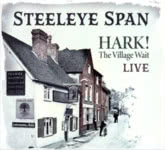 |
Hark! The Village Wait Live Park Records PRK CD157 (CD, UK, 17 October 2021) |
Recorded on the road in 2017, live engineer Chris Finn;
Mixed by Bob Prowse execept track 14 mixed by Sean Genockey;
Mastered by Bob Prowse;
Design by Gwen Morgan (note the new pub sign from
Wintersmith
and the advert for
Est’d 1969)
Musicians
Maddy Prior: vocals;
Jessie May Smart: violin, vocals;
Julian Littman: guitar, mandolin, keyboards, vocals;
Andrew ‘Spud’ Sinclair: guitar, vocals;
Benji Kirkpatrick: bouzouki, guitar, mandolin, banjo, vocals;
Roger Carey: bass, vocals;
Liam Genockey: drums, percussion
Tracks
- A Calling-On Song / The Blacksmith (Roud 816) (5.08)
- Fisherman’s Wife (2.40)
- The Blackleg Miner (Roud 3193) (3.08)
- The Dark-Eyed Sailor (Roud 265; Laws N35; G/D 5:1037; Henry H232) (4.56)
- Copshawholme Fair (Roud 9139) (3.32)
- All Things Are Quite Silent (Roud 2532) (3.18)
- The Hills of Greenmore (Roud 2883) (3.44)
- My Johnny Was a Shoemaker (Roud 1388; G/D 8:1848) (1.26)
- Lowlands of Holland (Roud 484; G/D 6:1116; Henry H180) (4.18)
- Twa Corbies (Roud 5; Child 26) (2.52)
- One Night As I Lay on My Bed (Roud 672) (3.32)
Bonus Tracks
- Marrowbones (Roud 183; Laws Q2; G/D 2:318; Henry H174; TYG 6) (4.00)
- London (3.18)
- When I Was on Horseback (Roud 2; Laws Q26) (5.20)
All tracks trad. arr. Steeleye Span except
Track 1a Ashley Hutchings;
Track 2 Ewan MacColl

